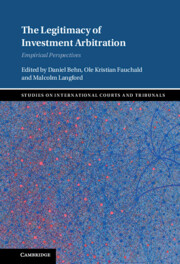Book contents
- The Legitimacy of Investment Arbitration
- Studies on International Courts and Tribunals
- The Legitimacy of Investment Arbitration
- Copyright page
- Contents
- Figures
- Tables
- Contributors
- 1 Introduction: The Legitimacy Crisis and the Empirical Turn
- 2 The International Investment Regime and Its Discontents
- Part I Process Legitimacy
- 3 Testing Cognitive Bias: Experimental Approaches and Investment Arbitration
- 4 The Influence of Law Firms in Investment Arbitration
- 5 Arbitrator Challenges in International Investment Tribunals
- 6 Dissents in Investment Arbitration: On Collegiality and Individualism
- Part II Process Legitimacy
- Part III Output Legitimacy
- Part IV Legitimation Strategies
- Index
6 - Dissents in Investment Arbitration: On Collegiality and Individualism
from Part I - Process Legitimacy
Published online by Cambridge University Press: 06 January 2022
- The Legitimacy of Investment Arbitration
- Studies on International Courts and Tribunals
- The Legitimacy of Investment Arbitration
- Copyright page
- Contents
- Figures
- Tables
- Contributors
- 1 Introduction: The Legitimacy Crisis and the Empirical Turn
- 2 The International Investment Regime and Its Discontents
- Part I Process Legitimacy
- 3 Testing Cognitive Bias: Experimental Approaches and Investment Arbitration
- 4 The Influence of Law Firms in Investment Arbitration
- 5 Arbitrator Challenges in International Investment Tribunals
- 6 Dissents in Investment Arbitration: On Collegiality and Individualism
- Part II Process Legitimacy
- Part III Output Legitimacy
- Part IV Legitimation Strategies
- Index
Summary
An enduring criticism of international arbitration and its legitimacy is that parties can appoint ‘their’ arbitrator unilaterally, which is by itself contrary to traditional notions of judicial impartiality. As a result, the striking lack of dissents and their asymmetry when they occur – usually by the losing party appointed arbitrator – raises questions over whether arbitrators act independently and impartially in relation to the party that appointed them. This chapter investigates whether a background in civil law, as opposed to common law where dissent is a more familiar phenomenon, could explain the absence of arbitral dissents. Using PITAD data on both dissents and arbitrator background, the author explores this potential causal factor. The findings, that differences in background seem unrelated to frequency of dissents, lends some support to the view that the relationship between an arbitrator and the appointing party is a main driver of dissenting opinions.
Keywords
- Type
- Chapter
- Information
- The Legitimacy of Investment ArbitrationEmpirical Perspectives, pp. 159 - 168Publisher: Cambridge University PressPrint publication year: 2022

